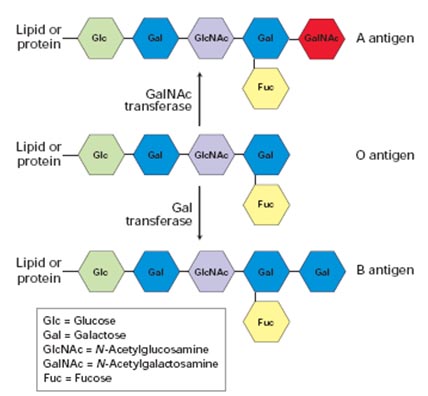People with type O blood have anti-A and anti-B antibodies, even without receiving a transfusion. Why?
-
1$\begingroup$ I'm supposing that you're asking why O-type individuals have anti-A and anti-B antibodies without having had any transfusion, because if they had the antigens in their blood they would not produce antibodies (the molecule would be recognised as self). Anyway, I believe you want to improve your question a bit. $\endgroup$– user24284Commented May 6, 2017 at 15:01
-
$\begingroup$ On a second thought, I should simply delete my answer: your question's title is kind of understandable, but your question's body makes no sense! Maybe the person who upvoted it may shed a light on this. $\endgroup$– user24284Commented May 6, 2017 at 15:04
-
4$\begingroup$ @GerardoFurtado — Take the bull by the horns and rewrite the question to fit your answer, otherwise the whole thing is meaningless and is likely to be shot down as such. Are you sure the question has not already been asked? $\endgroup$– DavidCommented May 6, 2017 at 15:05
-
$\begingroup$ @David The problem is that, despite the title being somehow meaningful, the body of the question makes no sense. I'm afraid of, by editing it, turning it into something different from OP's intent (whatever it is). Well, I'll try, OP can roll it back anyway if he/she doesn't like the edit. $\endgroup$– user24284Commented May 6, 2017 at 15:07
-
$\begingroup$ Similar to biology.stackexchange.com/a/5724/1320 $\endgroup$– Alan BoydCommented May 7, 2017 at 14:48
2 Answers
To understand what's happening here, let's have a look at the actual ABH (or ABO) antigens:
As you can see, they are not very big molecules: quite the opposite, they are relatively small globosides.
That being said, how is it possible a type O individual producing anti-A and anti-B antibodies without having any contact with the antigens? And that is the same as asking "how is it possible that a type A individual produced anti-B antibodies without having any contact with the antigen?"
The answer is: there was contact with the antigens, even without a blood transfusion.
According to Laura Dean (Blood Groups and Red Cell Antigens, chapter 5):
ABO antibodies in the serum are formed naturally. Their production is stimulated when the immune system encounters the "missing" ABO blood group antigens in foods or in micro-organisms. This happens at an early age because sugars that are identical to, or very similar to, the ABO blood group antigens are found throughout nature.
Thus, from an early age, we have contact with the antigens, coming from food or bacteria in our digestive system. As we get in contacts with antigens A and B, this is what happens:
- People with type A blood: they will produce anti-B antibodies.
- People with type B blood: they will produce anti-A antibodies.
- People with type O blood: they will produce anti-A and anti-B antibodies.
- People with type AB blood: they won't produce antibodies (regarding A and B antigens).
Source: Dean, L. (2005). Blood groups and red cell antigens. 1st ed. Bethesda, Md.: NCBI.
Antibody-producing cells (B lymphocytes) generate antibodies through a gene recombination process, that allows a virtually infinite number of antibodies to different antigens to be created, including against self-antigens (https://en.wikipedia.org/wiki/V(D)J_recombination).
A process of maturation, if working correctly, allows for those cells producing antibodies that strongly bind to self-antigens to be suppressed or eliminated, preventing autoimmune attacks (https://en.wikipedia.org/wiki/Immune_tolerance). In this process, specialized cells present a myriad of self-antigens to the maturing lymphocytes, signalizing them to undergo apoptosis or become regulatory cells if they bind to them. Organisms with the A antigen will present it to maturing lymphocytes and thus create tolerance to it, not having cells producing A-antigen binding antibodies; but they don't have the B antigen, so their lymphocytes won't be selected over it, and they will have cells producing B-antigen binding antibodies, which, if such antigen is introduced into the body, will mount an immune response against it.
Likewise, someone with an O type blood won't have both the A and B antigens, and so cells producing antibodies that bind to them will be allowed to mature, and they will have anti-A and anti-B antibodies circulating in the blood.
In conclusion, we can and do have antibodies for more antigens than we will ever encounter, and we have then before ever encountering them. If we do encounter them, then the cells that produce those antibodies will multiply and the number of those antibodies will greatly grow. Typically, we only don't have antibodies for self-antigens.

